
Build your retirement savings with 2.00% interest, tax-deferred contributions and zero fees.

Earn a guaranteed 3.35% in your RRSP when you lock in for 1 year.

See our ranking of the best RRSP accounts and rates available in Canada.
MoneySense is an award-winning magazine, helping Canadians navigate money matters since 1999. Our editorial team of trained journalists works closely with leading personal finance experts in Canada. To help you find the best financial products, we compare the offerings from over 12 major institutions, including banks, credit unions and card issuers. Learn more about our advertising and trusted partners.
Counter-tariffs challenging but ‘manageable’ for Dollarama: CEO
Dollarama Inc. (TSE: DOL)
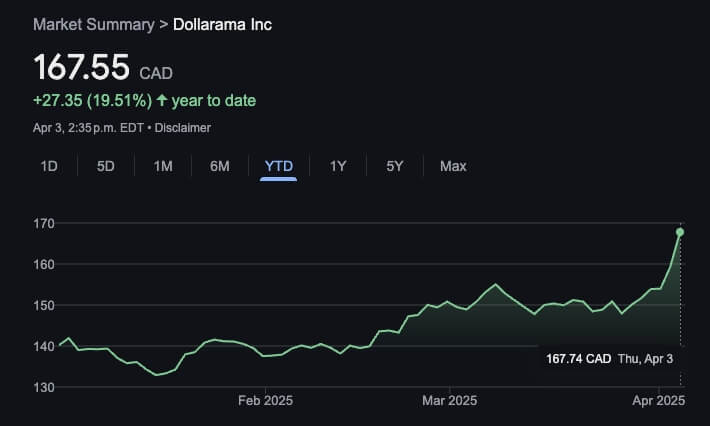 Source: Google
Source: Google
Dollarama Inc. says its business stands to be shaken but not upended by counter-tariffs Canada has applied to goods coming in from the U.S.
Chief executive Neil Rossy told analysts on a call Thursday that the ongoing trade war that prompted two rounds of retaliatory tariffs from Canada on items like food, paper and sporting goods are having “not an inconsequential impact” on his dollar store company.
However, he maintained the impact is both “manageable” and being faced by the Montreal-based company’s peers.
“We think that consumer confidence will be a major challenge with these tariff discussions while they continue,” Rossy said.
“While our concept may be more resilient than most, when consumers spend less, they tend to spend everywhere, so tariff wars are not good for anyone.”
Rossy’s remarks came a day after U.S. President Donald Trump delivered a wallop when he imposed a 10% baseline tariff on imports from most countries and revealed a lengthy list of additional duties dozens of nations will additionally face.
Goods compliant with the Canada-U.S.-Mexico trade agreement were spared but imports outside of the pact will face 25% levies. Trump also added 25% tariffs on automobile imports, matching the 25% duties previously imposed on steel and aluminum imports into the U.S.
In response, Canada imposed a round of retaliatory tariffs on March 4. Another tranche came into play on March 12.
The part of Dollarama’s business Rossy thinks could be most affected by tariffs are “consumables.” This category spans paper, plastic and foil products, cleaning supplies, basic health and beauty care items, pet food, confectionary, drinks, snacks and other food merchandise.
To mitigate any effects on these items, Rossy said the company could look to product substitutions or pricing adjustments “where necessary.”
When analysts questioned whether the buy Canadian wave that has materialized across the country would benefit the company, Rossy said, “I can’t tell you in our case that would be something we’ve seen.”
While his company was founded in Canada and has significant operations in the country and a Canadian management team, Rossy said “we are not trying to … maple glaze the Dollarama brand too much.”
“The reality is we try to provide great value every day of the year with or without tariff wars and I would think that Canadians are proud of the fact that Dollarama is a Canadian business to start with,” he said.
The company’s ability to provide value at a low cost helped pushed its fourth-quarter earnings to $391 million or $1.40 per diluted share.
The result announced Thursday for the period ended Feb. 2 was up from a profit of $323.8 million or $1.15 per diluted share a year earlier.
Sales for the quarter totalled $1.88 billion, up from $1.64 billion in the same quarter last year.
Comparable store sales growth for the quarter was 4.9% including a 5.3% increase in the number of transactions and a 0.4% decrease in average transaction size.
The quarter covered a period Dollarama spent advancing plans to open a Calgary-area distribution centre by the end of 2027 and operate 2,200 stores by 2034.
Rossy said Thursday that project planning for the facility opening in Balzac, a hamlet outside Calgary that is known for hosting retailer warehouses, is in “full swing,” with construction to begin this summer.
In the second half of the year, Dollarama also expects to close on a transaction announced last month that will see it buy Australian discount retailer, the Reject Shop.
The deal valued at $233 million is expected to see Dollarama expand the Australian acquisition’s footprint to about 700 stores by 2034.
Rossy expects it to take upwards of three years to transition the Reject Shop to Dollarama’s model, which he sees as the way to boost the company’s margins and growth over the long term.
Stellantis temporarily shuts plant as automakers grapple with new tariffs
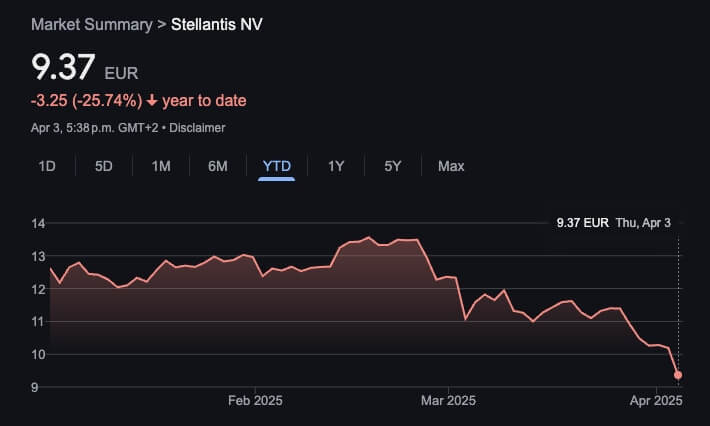 Source: Google
Source: Google
The fallout of the auto tariffs U.S. President Donald Trump has imposed on vehicle imports is already starting to show as Stellantis pauses production at its Windsor, Ont., assembly plant.
The two-week shutdown of the Canadian plant, as well as some Mexican plants, comes as automakers work to figure out how to respond to the 25% U.S. import tariffs that came into effect Thursday.
“Stellantis continues to assess the effects of the recently announced U.S. tariffs on imported vehicles and will continue to engage with the U.S. administration on these policy changes,” said spokeswoman LouAnn Gosselin in a statement.
Unifor Local 444 president James Stewart said in a statement that the union had heard downtime could be coming given tariffs and other factors, but that it’s still frustrating.
“Your union is closely monitoring the situation and will continue to push for clarity and accountability from the company,” he said.
The heavy tariffs throw into disarray the highly integrated auto industry, built on the foundation of free trade in North America.
Automakers still have some reprieve, as tariffs are on hold for vehicles compliant with the Canada-U.S.-Mexico free trade agreement. But that’s only until the U.S. determines how it will exempt just the value of U.S. parts in the vehicle.
Other automakers in Canada are also grappling with how to navigate the disruptive developments but some are pushing on with production.
Honda Canada confirmed its Alliston, Ont., plant, which employs more than 4,000 workers and produces around 400,000 Civics and CR-Vs a year, is still running.
“We are working with our manufacturing, parts, trade and logistics providers across North America to understand the impact of the announced U.S. tariffs and we will adopt a measured, thoughtful approach to actively address both immediate and future effects,” said spokesman Ken Chiu.
Toyota Canada, which produces around 350,000 RAV4s and 110,000 Lexus crossovers at its plants in Cambridge and Woodstock, Ont., also confirmed production has not been affected.
“While this is still a highly fluid situation, we have no plans to change our production within the foreseeable future. Our vehicles are in high demand, and we will continue to build to plan,” said spokesman Philippe Crowe in a statement.
“At the same time, we will continue to work with our federal and provincial governments toward a sustainable solution.”
Other automakers including Ford and GM did not immediately respond to a request for comment.
Tariffs will force the shutdown of many other auto plants, said Flavio Volpe, president of the Automotive Parts Manufacturers’ Association, on social media shortly after Trump confirmed he was going ahead with the auto tariffs.
Volpe said Canada avoiding reciprocal tariffs while still being subject to auto and metal tariffs was like “dodging a bullet into the path of a tank.”
Unifor national president Lana Payne said in a statement that Trump is clearly trying to pick off Canadian industries one by one.
“The reality is that this trade war is just getting started and Canada is still feeling the pain of U.S. trade penalties disproportionately worse than any country in the world. That’s why Canada needs the strongest possible response to these tariffs while we work toward building a more resilient Canadian economy.”
Canadian apparel company stock prices fall after tariff announcement
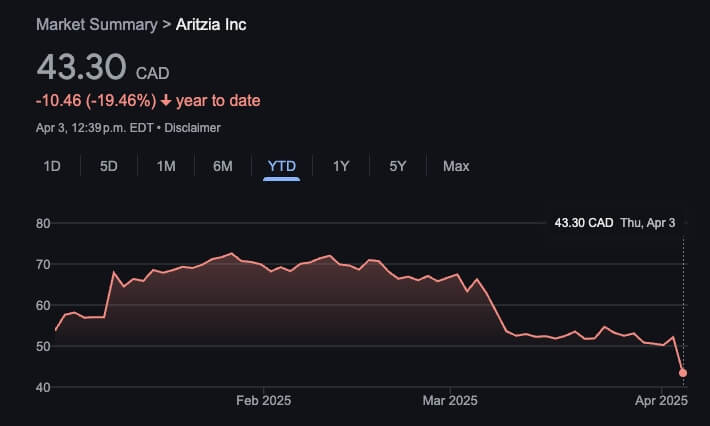 Source: Google
Source: Google
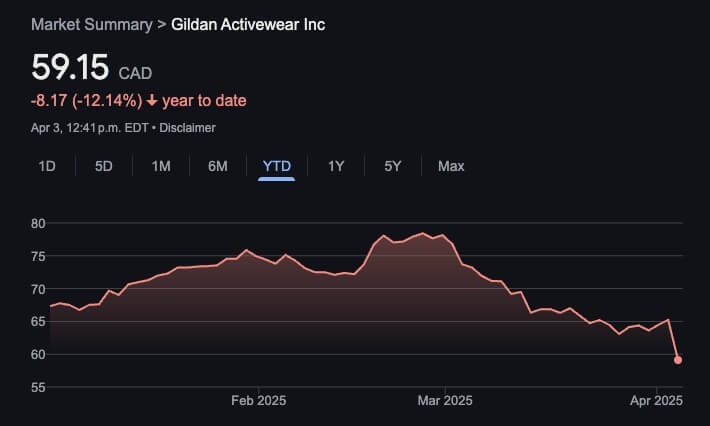 Source: Google
Source: Google
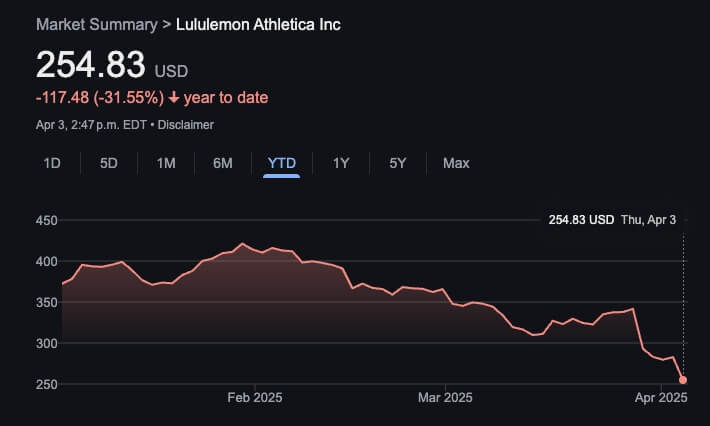 Source: Google
Source: Google
Canadian apparel companies including Aritzia and Lululemon saw their stock prices slide in late-morning trading as investors reacted to the sweeping new tariffs announced by U.S. President Donald Trump on Wednesday.
Aritzia was the biggest loser on the TSX at noon, with shares down 20%, while Lululemon shares were down almost 12% on the Nasdaq.
Gildan shares were down more than 7% on the TSX.
Trump unveiled 10% tariffs on imports from most countries on Wednesday after markets closed, as well as additional tariffs for dozens of countries.
Canada was left out of the new tariffs but already faces duties on a variety of its goods including auto and steel and aluminum.
Economists have been sounding the alarm over Trump’s tariff policies, saying they are likely to lead to a recession.
MoneySense’s ETF Screener Tool
Read more about investing:
Best ETFs in Canada National Bank to buy Canadian Western Bank at $5 billion valuation Buying your first stocks in Canada How much is capital gains tax and other questions answeredThe post Stock market news for investors: Dollarama braces for impact, Stellantis hits pause, and apparel stocks dive as U.S. imposes tariffs appeared first on MoneySense.











 Bengali (Bangladesh) ·
Bengali (Bangladesh) ·  English (United States) ·
English (United States) ·